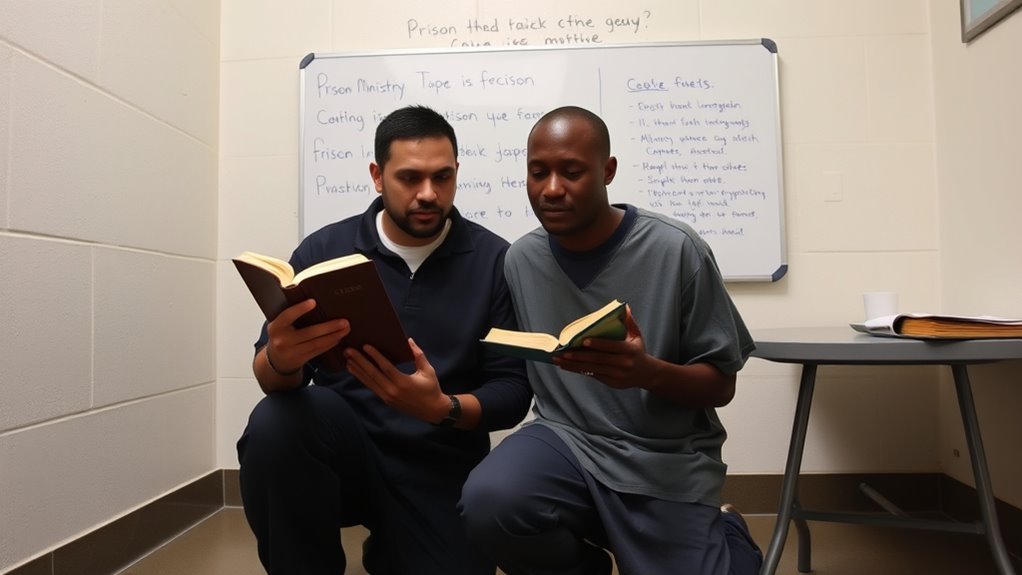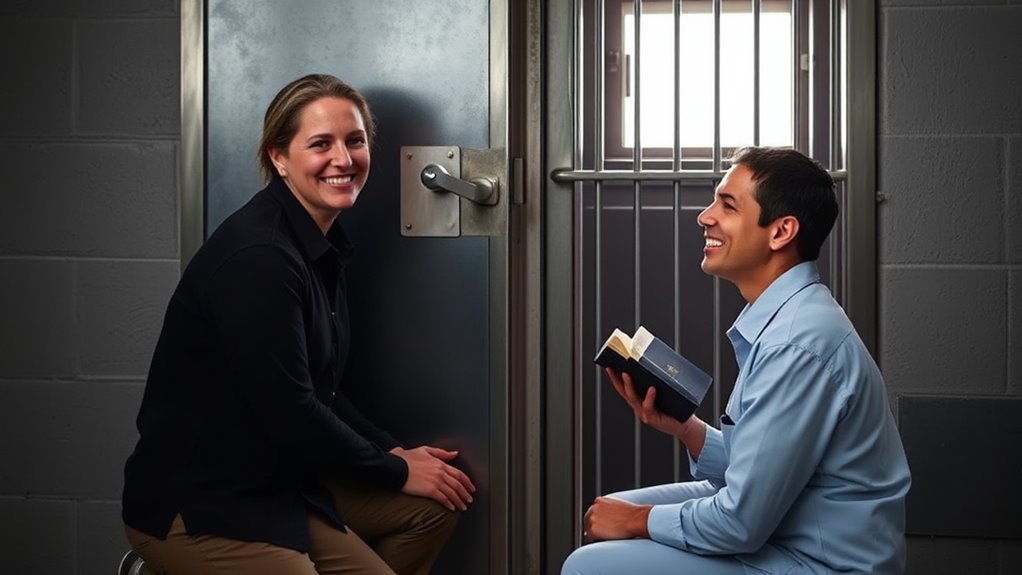To start in prison ministry, begin by reflecting through prayer to understand your calling and seek spiritual guidance. Research local programs or faith-based organizations where you can volunteer, and develop skills like active listening and confidentiality. Connect with prison staff and understand their policies to build trust. Commit to ongoing education and spiritual growth, ensuring you’re prepared for the emotional and practical aspects. Keep exploring; you’ll discover more ways to serve effectively along the way.
Key Takeaways
- Engage in prayer and reflection to discern your calling and develop humility for effective prison ministry.
- Research local prison outreach programs and connect with faith-based organizations for volunteer opportunities.
- Understand prison policies and build relationships with staff to ensure respectful and collaborative ministry efforts.
- Obtain necessary certification to ensure credibility, meet legal requirements, and enhance your effectiveness.
- Build peer support networks for ongoing education, resource sharing, and emotional resilience in your ministry journey.
Reflecting on Your Call to Serve

Reflecting on your call to serve in prison ministry begins with understanding why you feel drawn to this specific form of outreach. Prayer reflection helps you connect deeply with your motivations and invites clarity through spiritual discernment. Take time to pray and ask for guidance, listening carefully to what God is leading you to do. Consider the moments that stirred your compassion or sparked a desire to serve those behind bars. This process isn’t about finding the perfect answer but about opening your heart to God’s direction. By engaging in prayer reflection regularly, you’ll gain insight into your calling and develop the humility and purpose needed to serve effectively. Trust that through spiritual discernment, your passion for prison ministry will become more focused and authentic.
Researching Local Prison Ministries and Opportunities

Once you’ve taken time to understand your calling through prayer and reflection, the next step is to identify opportunities to serve within your community. Start by researching local prison outreach programs and ministries that focus on inmate mentorship. Contact your church, community centers, or faith-based organizations to learn about their involvement in prison ministries. Check online resources or visit correctional facilities’ websites to find volunteer opportunities. Attend informational meetings or events to gain a clearer understanding of how you can contribute. Connecting with established prison outreach programs helps you understand their needs and how your skills can fit in. This research will guide you in choosing meaningful ways to serve and prepare you for a successful ministry.
Building the Necessary Knowledge and Skills

To effectively serve in a prison ministry, you need to build the necessary knowledge and skills that enable meaningful outreach. Understanding the unique environment of prisons helps you connect genuinely with inmates. Focus on developing skills in prison outreach by learning what resonates with incarcerated individuals and how to approach them with sensitivity and respect. Inmate counseling is also essential, as many inmates face emotional and spiritual struggles. Training in active listening, empathy, and confidentiality will enhance your ability to offer support and guidance. Consider attending workshops or courses on prison ministry, counseling techniques, and trauma-informed care. The more you learn about the specific challenges inmates face, the more effectively you’ll be able to share hope and encouragement.
Connecting With Prison Chaplains and Staff

Building strong relationships with prison chaplains and staff is essential for effective ministry, as they hold valuable insights and play a key role in the facility’s spiritual environment. To connect well, familiarize yourself with prison policy and procedures, respecting their established protocols. Understand inmate rights and how they influence spiritual programs, ensuring your efforts align with regulations. Approach staff with professionalism, showing respect for their authority and responsibilities. Ask questions about the facility’s needs and how your ministry can support their goals. Maintaining open communication fosters trust and cooperation. By demonstrating respect for prison policies and inmate rights, you’ll build credibility, making it easier to collaborate and create meaningful spiritual opportunities within the prison setting.
Preparing Your Heart and Mind Spiritually

Preparing your heart and mind spiritually is essential before engaging in prison ministry, as it sets the foundation for genuine connection and effective service. Developing a prayer discipline helps you stay grounded, seeking God’s guidance and strength daily. Regular prayer fosters humility, patience, and compassion—qualities crucial when ministering to inmates. Building spiritual resilience allows you to withstand emotional challenges and setbacks, keeping your focus on Christ’s love. Take time to reflect, meditate, and listen for God’s voice. This preparation nurtures a sincere, compassionate approach and helps you remain centered amid difficult circumstances. When your heart is aligned with God’s purpose, your words and actions become more impactful. Spiritual readiness empowers you to serve with authenticity, patience, and grace.
Volunteering and Gaining Practical Experience

Gaining practical experience through volunteering is essential to becoming an effective prison minister. When you participate in prison visitation, you develop a deeper understanding of inmates’ needs and challenges. This hands-on approach boosts your emotional resilience, helping you stay compassionate amid difficult circumstances. To maximize your growth, consider these steps:
Volunteering in prison visitation enhances understanding, builds resilience, and deepens compassion for effective ministry.
- Observe and listen carefully—learn what resonates with inmates and how they respond.
- Build relationships gradually—trust takes time, so be patient and consistent.
- Reflect on your experiences—regularly assess your emotional resilience and adjust your approach accordingly.
Through direct involvement, you’ll refine your skills, deepen your empathy, and become better equipped to serve others in this demanding environment. Volunteering transforms theory into practical, impactful ministry.
Establishing Personal Boundaries and Safety Measures

How can you guarantee your safety and maintain healthy boundaries while serving in a prison ministry? First, establish clear personal boundaries to protect your emotional well-being. Follow confidentiality protocols strictly—never share details beyond authorized personnel. Familiarize yourself with emergency procedures so you can respond quickly if needed. Use the table below to understand key safety measures:
| Safety Measure | Description |
|---|---|
| Confidentiality Protocols | Respect privacy to build trust and avoid complications. |
| Emergency Procedures | Know the steps to stay safe during incidents or crises. |
| Personal Boundaries | Maintain appropriate physical and emotional limits. |
| Support System | Have contacts outside the prison for support. |
Staying vigilant and prepared helps you serve effectively while safeguarding yourself.
Continuing Education and Growing in Your Ministry

To grow in your prison ministry, staying engaged in relevant workshops and training sessions is essential. Pursuing formal certification can deepen your skills and credibility, while building peer support networks offers valuable encouragement and shared insights. These steps help you continue learning and strengthen your impact in the ministry.
Engage in Relevant Workshops
Have you ever considered how participating in relevant workshops can elevate your prison ministry? These opportunities allow you to deepen your understanding and skills, especially in areas like prison art and inmate mentorship. Attending workshops can help you connect with others who share your passion and introduce fresh approaches to your outreach.
Here are three ways workshops can benefit you:
- Develop new techniques in prison art to inspire creativity and healing.
- Learn effective inmate mentorship strategies to foster trust and growth.
- Gain insights into the needs of inmates, improving your ministry’s relevance.
Pursue Formal Certification
Pursuing formal certification is an essential step in strengthening your prison ministry and demonstrating your commitment to growth. Certification programs provide you with essential knowledge, credibility, and confidence in your outreach efforts. To meet legal requirements and guarantee your ministry is compliant, you should research the specific certifications relevant to your region or facility. These programs often cover topics like ethics, safety, counseling techniques, and cultural sensitivity. Completing certification not only boosts your skills but also shows your dedication to professional development. It can open doors to more opportunities within the prison system and increase trust with staff and inmates. Keep in mind, ongoing education helps you stay updated on best practices, ensuring your ministry remains effective and compliant with evolving regulations.
Build Peer Support Networks
How can you guarantee your prison ministry continues to grow and improve? Building peer support networks is essential. Connecting with others who share your passion creates emotional resilience and offers fresh insights. These networks provide a foundation to share challenges, celebrate successes, and learn from each other. To strengthen your ministry:
- Develop regular meetings to foster trust and open communication.
- Share resources and training opportunities to enhance skills and knowledge.
- Encourage peer mentoring, so experienced volunteers support newcomers and sustain enthusiasm.
Frequently Asked Questions
How Do I Handle Emotional Challenges When Working With Inmates?
When facing emotional challenges, you should prioritize self-care strategies to maintain your emotional resilience. Recognize your feelings, take breaks when needed, and seek support from fellow volunteers or counselors. Remember, it’s normal to feel overwhelmed; don’t hesitate to set boundaries and practice mindfulness. By actively caring for yourself, you’ll stay strong and better serve inmates, ensuring your emotional well-being remains intact while making a meaningful impact.
What Legal Considerations Should I Be Aware of in Prison Ministry?
Think of legal considerations as the foundation of a sturdy bridge; without it, the structure can collapse. You must prioritize legal compliance and respect inmate rights, ensuring your ministry actions align with laws and regulations. For example, understanding confidentiality rules protects both you and inmates, preventing legal issues. Staying informed about policies helps you serve effectively while avoiding unintended violations, just like a well-built bridge supports safe passage.
How Can I Effectively Share My Faith Without Proselytizing?
You can effectively share your faith by practicing respectful engagement and cultural sensitivity. Focus on building genuine relationships, listen actively, and offer support without pushing beliefs. Share your personal experiences and values naturally, allowing others to ask questions if interested. By respecting individual boundaries and avoiding proselytizing tactics, you create a safe space for meaningful conversations that honor each person’s spiritual journey.
What Are Common Misconceptions About Prison Ministry?
Many people believe prison ministry is only about religious conversion, but it’s actually about supporting rehabilitation efforts. Some think volunteers need special training, but effective ministry relies on understanding and compassion, not just formal training. You might also assume prison ministry is only for religious people, yet anyone committed to helping can participate. Recognizing these misconceptions helps you approach prison ministry with an open mind and genuine desire to make a difference.
How Do I Maintain Confidentiality and Trust With Inmates?
Building rapport is essential, but you can’t build trust on shaky ground. To maintain confidentiality, always respect boundaries and keep inmate information private. Be honest and consistent in your actions, showing you genuinely care without overstepping. Remember, trust is a two-way street—listen more than you speak, and treat every conversation with respect. When you honor their privacy, you’ll create a safe space where inmates feel valued and understood.
Conclusion
As you step into prison ministry, remember you’re not just entering a place—you’re becoming a beacon of hope in a world that desperately needs it. Embrace the calling with open heart and unwavering faith, knowing your kindness can plant seeds of transformation. Your dedication can turn barriers into bridges—truly, your compassion has the power to change lives forever. Keep going, because every act of love writes a new story of redemption.










